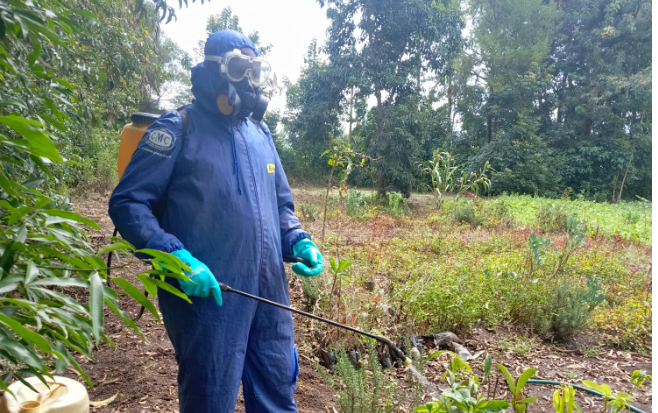

More than 2,600 spray service providers have been trained in 16 agricultural counties to promote responsible pesticide use and enhance food safety.
The initiative, led by AAK-Grow stewardship officer Velma Wekesa, targets men aged 18 to 45. They are equipped with skills to address the widespread misuse of pesticides among smallholder farmers.
“Many farmers in Kenya do not read or understand pesticide labels, largely due to illiteracy or lack of awareness. This leads to misuse, overuse, and ultimately unsafe food,” she said.
The SSP concept was introduced by AAK-Grow after identifying a knowledge gap in pesticide application among smallholder farmers.
Today, SSPs are trained community members who provide critical services, including proper interpretation of pesticide labels, use of personal protective equipment, identification of counterfeit products and calibration of knapsack sprayers.
“Most farmers reuse knapsack sprayers for years without calibrating them, which leads to excessive pesticide use. SSPs are trained to address this,” Wekesa said.
The SSPs also support safe environmental practices by collecting and disposing of empty pesticide containers properly. While the services are community-based, they are not free; farmers pay an average of Sh50 to Sh100 per spray, depending on location.
In addition to spraying, SSPs offer pest scouting, pest and disease identification, pesticide recommendations and environmental clean-up through proper disposal of containers.
“It’s a win-win model. Farmers receive professional support that ensures food safety, while SSPs earn a modest income,” Wekesa said.
Although the programme mainly trains men, AAK-Grow advises against women directly handling pesticides.
“Women are caregivers; they prepare food and look after children. Even with protective gear, the risk of household contamination remains high,” Wekesa explained.
She said the SSP model also benefits women who may not have male relatives to assist with spraying. They can now access trained SSPs within their communities for safe and professional pesticide application.
With growing concern over food safety, AAK-Grow is urging more farmers to make use of trained SSPs. Wekesa encouraged farmers to contact local agricultural offices for referrals to certified providers.
“When farmers engage trained SSPs, we reduce misuse, protect the environment, and ensure safe food on every Kenyan’s table,” she said.
Beyond responsible pesticide use, the industry is also stepping up efforts to safely dispose of containers through new waste management regulations.
Joel Mutai, regulatory policy and standards manager at AAK-Grow, pointed out that proper disposal of empty pesticide containers is crucial to safeguarding health and the environment.
Speaking during a field tour in Nakuru county, Mutai said AAK-Grow has been running a successful initiative to promote full life-cycle management of pesticide containers, from use to safe disposal.
“Farmers are trained to triple-rinse containers to remove harmful residues. After that, they break them and place them in designated collection bags to prevent misuse,” he explained.
This effort is now being integrated into the Extended Producer Responsibility (EPR) Regulation, a national framework under the National Environment Management Authority that requires producers to take full responsibility for managing waste linked to their products.
“The EPR regulation mandates the formation of Producer Responsibility Organisations (PRO), which oversee the collection and disposal of waste across the country,” Mutai said.
He said AAK-Grow, alongside other stakeholders managing hazardous waste such as agrochemicals, petroleum and pharmaceuticals, has formed the Hazardous Producer Responsibility Organisation of Kenya (HAPRO) in compliance with the new regulation.
“This regulation ensures that containers aren’t misused, for example, being repurposed to store milk or drinking water, which poses serious health risks,” he said. “Improper disposal also threatens water sources and the broader environment.”
Mutai said the EPR regulation applies to all types of industrial and consumer waste and is based on the “polluter pays” principle that holds manufacturers and importers accountable for the waste generated by their products.
“Producers must either join or form a PRO. While managing waste individually is an option, it’s impractical to operate nationwide without shared infrastructure,” he said.
The regulation also requires the development of national waste management plans, including the opening of collection and aggregation centres, and working with certified recyclers and waste handlers.
Mutai said the industry continues to advocate for integrated pest management, which encourages farmers to use pesticides only when necessary.
“We don’t just tell farmers to spray. We promote pest scouting. If there are no pests, there’s no need to spray. And if pest levels are low, farmers can use biological controls instead of chemicals. This helps reduce production costs, protect the environment, and improve food safety,” he said.












